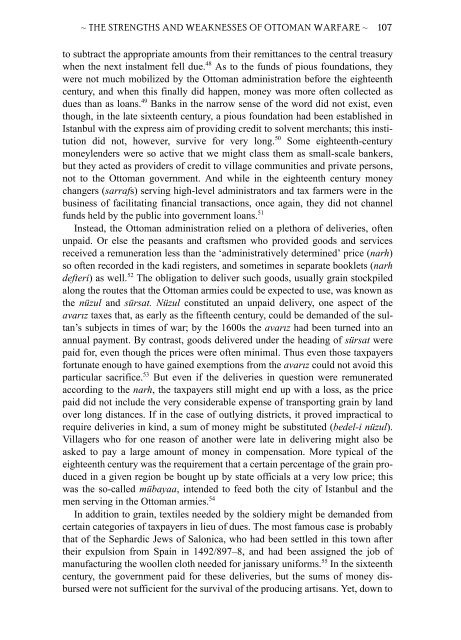The Ottoman Empire and the World Around It - Course Information
The Ottoman Empire and the World Around It - Course Information
The Ottoman Empire and the World Around It - Course Information
Create successful ePaper yourself
Turn your PDF publications into a flip-book with our unique Google optimized e-Paper software.
~ THE STRENGTHS AND WEAKNESSES OF OTTOMAN WARFARE ~ 107<br />
to subtract <strong>the</strong> appropriate amounts from <strong>the</strong>ir remittances to <strong>the</strong> central treasury<br />
when <strong>the</strong> next instalment fell due. 48 As to <strong>the</strong> funds of pious foundations, <strong>the</strong>y<br />
were not much mobilized by <strong>the</strong> <strong>Ottoman</strong> administration before <strong>the</strong> eighteenth<br />
century, <strong>and</strong> when this finally did happen, money was more often collected as<br />
dues than as loans. 49 Banks in <strong>the</strong> narrow sense of <strong>the</strong> word did not exist, even<br />
though, in <strong>the</strong> late sixteenth century, a pious foundation had been established in<br />
Istanbul with <strong>the</strong> express aim of providing credit to solvent merchants; this institution<br />
did not, however, survive for very long. 50 Some eighteenth-century<br />
moneylenders were so active that we might class <strong>the</strong>m as small-scale bankers,<br />
but <strong>the</strong>y acted as providers of credit to village communities <strong>and</strong> private persons,<br />
not to <strong>the</strong> <strong>Ottoman</strong> government. And while in <strong>the</strong> eighteenth century money<br />
changers (sarrafs) serving high-level administrators <strong>and</strong> tax farmers were in <strong>the</strong><br />
business of facilitating financial transactions, once again, <strong>the</strong>y did not channel<br />
funds held by <strong>the</strong> public into government loans. 51<br />
Instead, <strong>the</strong> <strong>Ottoman</strong> administration relied on a plethora of deliveries, often<br />
unpaid. Or else <strong>the</strong> peasants <strong>and</strong> craftsmen who provided goods <strong>and</strong> services<br />
received a remuneration less than <strong>the</strong> ‘administratively determined’ price (narh)<br />
so often recorded in <strong>the</strong> kadi registers, <strong>and</strong> sometimes in separate booklets (narh<br />
defteri) as well. 52 <strong>The</strong> obligation to deliver such goods, usually grain stockpiled<br />
along <strong>the</strong> routes that <strong>the</strong> <strong>Ottoman</strong> armies could be expected to use, was known as<br />
<strong>the</strong> nüzul <strong>and</strong> sürsat. Nüzul constituted an unpaid delivery, one aspect of <strong>the</strong><br />
avarız taxes that, as early as <strong>the</strong> fifteenth century, could be dem<strong>and</strong>ed of <strong>the</strong> sultan’s<br />
subjects in times of war; by <strong>the</strong> 1600s <strong>the</strong> avarız had been turned into an<br />
annual payment. By contrast, goods delivered under <strong>the</strong> heading of sürsat were<br />
paid for, even though <strong>the</strong> prices were often minimal. Thus even those taxpayers<br />
fortunate enough to have gained exemptions from <strong>the</strong> avarız could not avoid this<br />
particular sacrifice. 53 But even if <strong>the</strong> deliveries in question were remunerated<br />
according to <strong>the</strong> narh, <strong>the</strong> taxpayers still might end up with a loss, as <strong>the</strong> price<br />
paid did not include <strong>the</strong> very considerable expense of transporting grain by l<strong>and</strong><br />
over long distances. If in <strong>the</strong> case of outlying districts, it proved impractical to<br />
require deliveries in kind, a sum of money might be substituted (bedel-i nüzul).<br />
Villagers who for one reason of ano<strong>the</strong>r were late in delivering might also be<br />
asked to pay a large amount of money in compensation. More typical of <strong>the</strong><br />
eighteenth century was <strong>the</strong> requirement that a certain percentage of <strong>the</strong> grain produced<br />
in a given region be bought up by state officials at a very low price; this<br />
was <strong>the</strong> so-called mübayaa, intended to feed both <strong>the</strong> city of Istanbul <strong>and</strong> <strong>the</strong><br />
men serving in <strong>the</strong> <strong>Ottoman</strong> armies. 54<br />
In addition to grain, textiles needed by <strong>the</strong> soldiery might be dem<strong>and</strong>ed from<br />
certain categories of taxpayers in lieu of dues. <strong>The</strong> most famous case is probably<br />
that of <strong>the</strong> Sephardic Jews of Salonica, who had been settled in this town after<br />
<strong>the</strong>ir expulsion from Spain in 1492/897–8, <strong>and</strong> had been assigned <strong>the</strong> job of<br />
manufacturing <strong>the</strong> woollen cloth needed for janissary uniforms. 55 In <strong>the</strong> sixteenth<br />
century, <strong>the</strong> government paid for <strong>the</strong>se deliveries, but <strong>the</strong> sums of money disbursed<br />
were not sufficient for <strong>the</strong> survival of <strong>the</strong> producing artisans. Yet, down to


